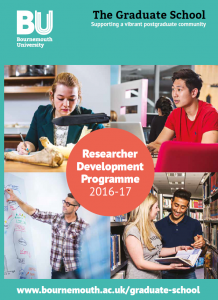 If you are thinking of applying for EU funding in the coming year, you need to be at this event!
If you are thinking of applying for EU funding in the coming year, you need to be at this event!
This session will be delivered by the UK Research Office’s BU account manager, Maribel Glogowski.
UKRO is the European office of the UK Research Councils. It delivers a subscription-based advisory service for research organisations (in the main UK HEIs) and provides National Contact Point services on behalf of the UK Government. UKRO’s mission is to maximise UK engagement in EU-funded research, innovation and higher education activities. As a BU member of staff, you can sign up to receive email alerts direct to your inbox.
The annual visit with take place from 12:30 – 15:15 in The Octagon, Sir Michael Cobham Library on Talbot Campus on Tuesday, 25th October. There are still some places free for the afternoon session only – if you find that you are now free and wish to attend, please come along but seating is prioritised by those who have pre-booked and then first come first served.
This event has been developed with UKRO to include up to date information about EU funding relevant to BU’s current and future bidding activities.
The intended learning outcomes of this session are:
- To find out about current EU funding thinking
- To raise personal awareness of funding calls with relevance to BU
Within the update, the afternoon session will specifically include:
- Creative Europe and Erasmus+
- Accessing the Societal Challenges
Maribel is based in Brussels, along with the rest of the UKRO team, so is BU’s perfect partner for keeping us up to date with funding developments in the EU.
If you have any questions about this event, please contact Emily Cieciura (RKEO, Research Facilitator: EU & International) or Dianne Goodman (RKEO, Funding Development Team Co-ordinator).
N.B. If you have pre-booked, the event will start at 11:30, as previously stated.
 There is now a static page introducing the BU Research and Knowledge Exchange Development Framework. If you are considering which sessions to book, this pages gives an overview of all the pathways and provides direct links to all the booking screens.
There is now a static page introducing the BU Research and Knowledge Exchange Development Framework. If you are considering which sessions to book, this pages gives an overview of all the pathways and provides direct links to all the booking screens.

 As part of the Research and Knowledge Exchange Development Framework, RKEO are holding a workshop for academics to learn more about funding opportunities from Innovate UK. This workshop will be led by our local Innovate UK KTP Adviser and the will be talking about various Innovate UK funding opportunities. There will also be a drop-in session for one-to-one advice.
As part of the Research and Knowledge Exchange Development Framework, RKEO are holding a workshop for academics to learn more about funding opportunities from Innovate UK. This workshop will be led by our local Innovate UK KTP Adviser and the will be talking about various Innovate UK funding opportunities. There will also be a drop-in session for one-to-one advice.



 The
The  For those of you who haven’t yet heard about the Research and Knowledge Exchange (
For those of you who haven’t yet heard about the Research and Knowledge Exchange (


















 Read and sign up to BU’s Policy Influence Digest
Read and sign up to BU’s Policy Influence Digest Upcoming opportunities for PGRs – collaborate externally
Upcoming opportunities for PGRs – collaborate externally BU involved in new MRF dissemination grant
BU involved in new MRF dissemination grant New COVID-19 publication
New COVID-19 publication MSCA Postdoctoral Fellowships 2024
MSCA Postdoctoral Fellowships 2024 Horizon Europe News – December 2023
Horizon Europe News – December 2023